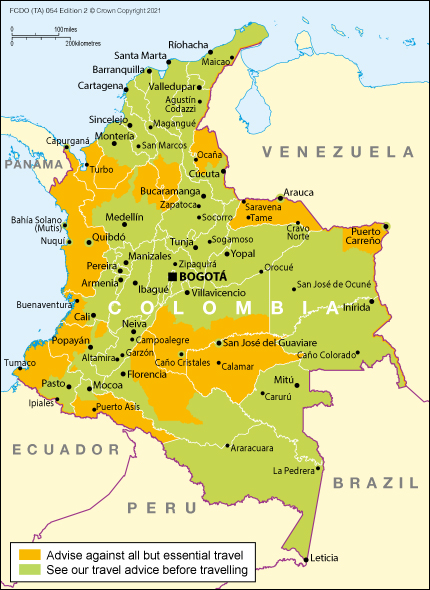Colombia
Summary

The Foreign, Commonwealth & Development Office (FCDO) advise against all but essential travel to:
- the departments of Arauca and Guaviare (except their capital cities Arauca and San José de Guaviare)
- the department of Chocó (except its capital Quibdó, the whale-watching towns of Nuquí and Bahía Solano, and the tourist site of Capurganá)
- the Ariari region of southern Meta (except the tourist site of Caño Cristales - if travelling to Caño Cristales, travel by air to and from the town of La Macarena with a reputable tour company)
- the South Pacific, Sanquianga and Telembi regions of Nariño
- the Western region of Cauca
- Buenaventura in the department of Valle del Cauca
- the Urabá and Bajo Cauca regions of Antioquia
- the region of Southern-Bolívar
- the region of Southern-Córdoba
- the Catatumbo region of Norte de Santander
- Orito, San Migue, Valle del Guamuez, Puerto Caicedo, Puerto Guzmán, Puerto Asis and Puerto Leguizamo in Putumayo
- Cartagena del Chairá, San Vicente del Caguan, Puerto Rico, El Doncello, Paujil and La Montañita in Caquetá
- the municipality of Puerto Carreño in Vichada, except the departmental capital
- within 5km of the Venezuelan border, except the cities of Cúcuta, Arauca and Puerto Carreño
- within 5km of the Ecuadorian border, except for the border crossing on the Pan-American highway at the Puente Internacional de Rumichaca and the city of Ipiales.
There are active wildfires across Colombia, including close to populated areas such as Bogotá. The Colombian Government has declared a state of natural disaster.
The wildfires could affect air traffic, roads and local businesses. If you are due to travel to an area that might be affected by wildfires, contact your travel operator or accommodation provider before you travel to check that it is not currently impacted. Make sure you have appropriate insurance.
If you are in or near areas currently affected by wildfires, follow the guidance of the local authorities and emergency services.
Before you travel, check the ‘Entry requirements’ section for Colombia’s current entry restrictions and requirements. These may change with little warning. Monitor this advice for the latest updates and stay in contact with your travel provider.
If you plan to pass through another country to return to the UK, check the travel advice for the country you’re transiting.
It is more important than ever to get travel insurance and check your cover. See the FCDO’s guidance on foreign travel insurance.
Terrorists are very likely to try to carry out attacks in Colombia. The security situation can change very quickly in many areas of the country. You should pay close attention to warnings issued by the Colombian authorities. See Terrorism
State and local elections will take place on 29 October. Expect a heightened risk of demonstrations, possible violence and police and military presence. Potential travel disruptions are possible. British nationals are advised to avoid large gatherings or political rallies and remain vigilant around polling stations. See Safety and security.
Protests can occur at short notice, impacting roads and transport. These demonstrations can be confrontational and may turn violent. A number of people have been killed and injured in previous protests. You should remain vigilant, avoid all demonstrations, and monitor local media for the latest information.
Despite high levels of crime, most visits to Colombia are trouble-free. See Crime
If you’re abroad and you need emergency help from the UK government, contact the nearest British embassy, consulate or high commission. Consular support is limited in parts of Colombia where we advise against all but essential travel and areas where there is a limited state presence. When consular support is unavailable, the British Embassy will liaise with local authorities to request assistance.
If you need to contact the emergency services, call 123 (in Spanish).
UK health authorities have classified Colombia as having a risk of Zika virus transmission. For more information and advice, visit the website of the National Travel Health Network and Centre website.
The Overseas Business Risk service offers information and advice for British companies operating overseas on how to manage political, economic, and business security-related risks.